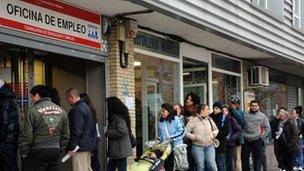Europe's storm clouds cast a long shadow
- Published

Some Greeks have reacted with fury to the prospect of further austerity
Maybe it's the Irn Bru syndrome - a Scottish exceptionalism that protects it from the ways of the outside world.
Just as Cumbernauld's most famous product makes this the only country where Coca-Cola and Pepsi don't have the leading fizzy pop brand (though, I'm told, only if you separate Coke from Diet Coke) perhaps this country considers itself uniquely protected from having to concern itself with the threat of a eurozone meltdown.
That would help explain Sunday headlines on the launch of campaigns for and against independence, anti-bigotry laws and regimental heritage. It's easier to form an opinion about the late Abdelbaset al-Megrahi than it is to understand the implications of default, contagion and competitive devaluation.
But politics' dominant question of Scotland's constitutional future may turn out to have a lot to do with what's going on in Greece. It may be at the other end of Europe, but it has implications that could be coming soon to a job near you.
Even if the referendum campaign has 30 months to run, the aftershock from current political and economic events in Athens could have a significant impact on the decision about Scotland's future - and it's not clear which way turmoil could swing things.
Loans turn sour
So let's first consider how the eurozone crisis could come close to home. First affected would be banks, which have complex connections to other banks.
Lloyds Banking Group is by no means the most exposed to the eurozone's sovereign debt. At 31 March, that stood at a mere £379m. But its exposure to other debt was nearly £23bn. Of that, £14bn of that was in Ireland, mostly through business and household lending. Banks including Royal Bank of Scotland and Barclays have far more complex international linkages.

Unemployment is a serious problem in Spain, but it is still managing its debts
And why should Ireland become more of a problem? Well, it's doing what's been asked of it under the terms of its bailout package, but if Greece is allowed by the Germans and European Central Bank to default on its loans - indeed, if its people vote on 17 June to do so - then lenders will take fright about the others currently propped up by special lending packages.
Spain is the most immediately worrying after Greece, because it's so big. Portugal and Ireland are of a more manageable scale. But if a country the size of Spain, and then Italy, can't roll over debts, there's only so much even the mighty Germans can do to help.
So if the banks run into big losses as loans turn sour, that pushes up the cost for them of doing business, and that's something that gets passed on to customers - both householders with mortgages, and business customers, who are already finding credit conditions either tight or punitive or both.
Paella in peril
Next comes trade. Scottish exporters of high-value shellfish, many trucked live from the Hebrides to Bilbao and Madrid for freshness in Spanish paella, are already finding the Spanish market in trouble. One French-based fish trader with an operation in Glasgow has had to give up on Spanish customers because their credit isn't reliable.
Greece is a smaller market for exports, though it does have a taste for whisky, and Drambuie in particular. The drinks industry need not be too worried, as demand from outside the eurozone is so buoyant.
But a sharp contraction within the eurozone, if not its break-up, would surely have an impact on exports of seafood, agriculture and much else besides. What's more, firms that depend on inputs from the continent could find disruption in supply.
They're being advised to secure their supply chains, and to make sure contracts are denominated in a currency they trust. Some new contracts are avoiding talk of the euro to favour 'whatever applies in Germany', just in case.
Tourism trade
And then there's tourism. It's a big employer in Scotland, and it needs people to visit from the eurozone. A lurch into a much bigger crisis would hit that trade.
It is also likely to weaken the euro, at least in the short term - a process that's already under way. That's damaging to all Scottish exporters, most obviously those who run tourism businesses. Not only would the UK become more expensive to continentals, but the continent - or parts of it which fall out of the euro - would be cheaper to those of us who earn in sterling. So tourism here could have a triple whammy of lost overseas visitors due to lower earnings overseas, a weaker euro, and also fewer stay cations.
If the prospect of a weaker currency or currencies overseas has you booking for the beach in Greece this summer, a word of warning: the economic dislocation that could come with a 'grexit' from the euro could be accompanied by disruption to public services such as rail or air traffic control, and possibly descent into civil unrest.
And would electronic transactions would work? Don't be too sure. At such times, hard cash becomes king.
Oil on the slide
Next, take a look at oil. In a few weeks, a barrel of Brent crude has fallen from $125 to dip below $107 on Friday. That's partly due to eased political fears in the Middle East, but it's also because there's an expectation European demand for the black stuff is about to dip, along with its economy.
That's good news for those struggling to pay for a tank of petrol. But if it continues to slide at that pace, it's less good news for the economy of Aberdeen city and shire, which has been a beacon of success amid the gloom of recent years.
Drachma drama
Short term, a Greek default and euro exit could be extremely painful for Greek people. That seems to be the message they're being sent ahead of the 17 June election, when their choice either leads to repudiation of the bailout conditions or a knuckling down to them.
Longer term, they could find devaluation is the making of them. Although earnings and wealth would plummet with a devaluation of perhaps 40% or more, with imports far more expensive and inflation a threat, they could start growing from that point, having become much more competitive at exporting. That brings us back to your summer holiday plans.

Britain has already experienced a longer downturn than the 1930s depression
But three points about that. Devaluation has been the easy way out for inefficient and inflation-prone European economies in the past. They joined the euro to get away from the bad old ways.
Second, if others are forced out of the euro, to revert to the new peseta, escudo, lira or punt, competitive devaluations with the remaining eurozone and with each other are only short term answers. Britain got away with a big devaluation three years ago, under the cover of the financial crisis. But Europe can't afford for everyone to get in on that game.
Third, if southern Europe exits the euro in a state of distress, what happens to the remaining, more northerly core? It's not clear why it would also break up. So you might have 12 or more countries still using the euro, out of 17 at present. And without the weak southern part, the currency could strengthen substantially, making its exports more expensive and Britain's exports to the new northern eurozone rather cheaper.
Apocalypse then
So what does all this have to do with the independence referendum? Well, the level of disruption to business and to trade has already made this downturn longer than the 1930s Depression. Referendum year, 2014, is now the most optimistic target date for emerging out of it.
If the warnings of eurozone apocalpyse are even half right, a new and major crisis afflicting European markets will surely drag out the recovery process.
With that would come continuing business uncertainty and reluctance to invest, a likely continuing fall in real earnings and reduced household confidence, savings under water, and pension funds in deficit.
In Scotland, however many celebrities sign up to either side of the debate to make an emotional appeal for or against independence, there seems to be a consensus that the harder-nosed economic cases for and against independence are going to be very important to the referendum result.
It's not clear if, by autumn 2014, continuing austerity, unemployment, uncertainty and little or no growth will drive people towards independence or away from it; independence could be portrayed either as too big a risk to take in troubled times, or as the solution to Scotland's problems. The success of these two approaches depends how well politicians deploy their arguments.
But if there's one lesson becoming ever clearer from the eurozone crisis, it is that currency union requires a strong level of political union, to harmonise fiscal policies and borrowing. The growing concerns about American's state and municipal debts tell the same story.
So it's more difficult, at this time, to argue Scotland should have the freedom to run its own fiscal policies and to borrow, while also saying it wants a currency alliance with a central bank in either London or Frankfurt.